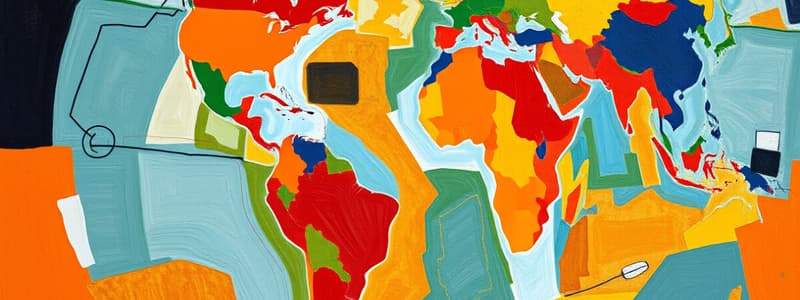Podcast
Questions and Answers
What economic theories were put into practice during the age of exploration?
What economic theories were put into practice during the age of exploration?
The belief that an economic system was based upon gold and silver.
How did the Columbian Exchange affect the Americas and Europe?
How did the Columbian Exchange affect the Americas and Europe?
The Columbian Exchange affected Europe with a rapid increase in European population; it affected Asia with an increase in population due to more food being grown per square acre with potatoes; and it brought diseases like smallpox to the natives.
How did the nature of European exploration change by the seventeenth century?
How did the nature of European exploration change by the seventeenth century?
The nature of exploration by the seventeenth century was chiefly by ships and naval exploration, with the Dutch ruling trade and surpassing other nations' economies during this period.
How was the Dutch form of mercantilism different from that of Portugal or Spain?
How was the Dutch form of mercantilism different from that of Portugal or Spain?
How did European expansion affect Africa and the slave trade?
How did European expansion affect Africa and the slave trade?
What was the Middle Passage?
What was the Middle Passage?
How did epidemics among the Native American populations contribute to an increase in the trade of enslaved Africans?
How did epidemics among the Native American populations contribute to an increase in the trade of enslaved Africans?
Flashcards are hidden until you start studying
Study Notes
Economic Theories in the Age of Exploration
- Economic systems were heavily influenced by the belief in the accumulation of gold and silver.
Impact of the Columbian Exchange
- Europe experienced a significant increase in population due to new food sources.
- Asia benefited from enhanced agricultural productivity, particularly with the introduction of potatoes.
- Native American cultures were severely affected due to the introduction of diseases, notably smallpox.
Changes in European Exploration by the Seventeenth Century
- Exploration became predominantly maritime, relying on ships and naval power.
- The Dutch emerged as the dominant players in global trade, surpassing other European nations economically.
Dutch Mercantilism vs. Other Nations
- The Dutch mercantilist approach was distinct as it primarily targeted the spice trade, differing from the broader mercantile strategies of Portugal and Spain.
Effects of European Expansion on Africa and the Slave Trade
- The demand for labor on plantations increased, leading to a heightened trade in enslaved Africans.
- This trade resulted in significant depopulation in various African regions due to the enslavement of large numbers of people.
Middle Passage
- Refers to the brutal forced transport of enslaved Africans across the Atlantic Ocean to the Americas.
Epidemics and the African Slave Trade
- High mortality rates from epidemics among Native American populations created an urgent demand for labor.
- African slaves were often perceived as better suited for labor, given their relative immunity to European diseases, thus accelerating the transatlantic slave trade.
Studying That Suits You
Use AI to generate personalized quizzes and flashcards to suit your learning preferences.



